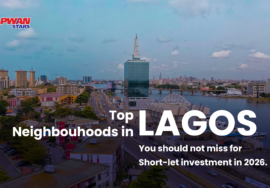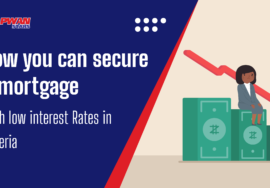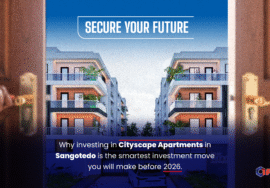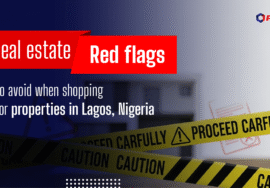
THE FUTURE OF REAL ESTATE IN LAGOS: TRENDS TO WATCH IN 2025
Table of Contents
Real estate trends in Lagos continue to evolve as Nigeria’s largest city experiences rapid urbanization. Lagos, often referred to as the country’s bustling economic powerhouse, attracts Nigerians from all walks of life who flock to the city daily in search of greener pastures. This steady population growth is shaping new real estate trends in Lagos, influencing demand, development patterns, and investment opportunities across both residential and commercial sectors.
With that rapid growth comes an ever-increasing demand for housing and commercial space. As the city evolves, the Lagos real estate market is undergoing transformative changes, influenced by both local and global factors.
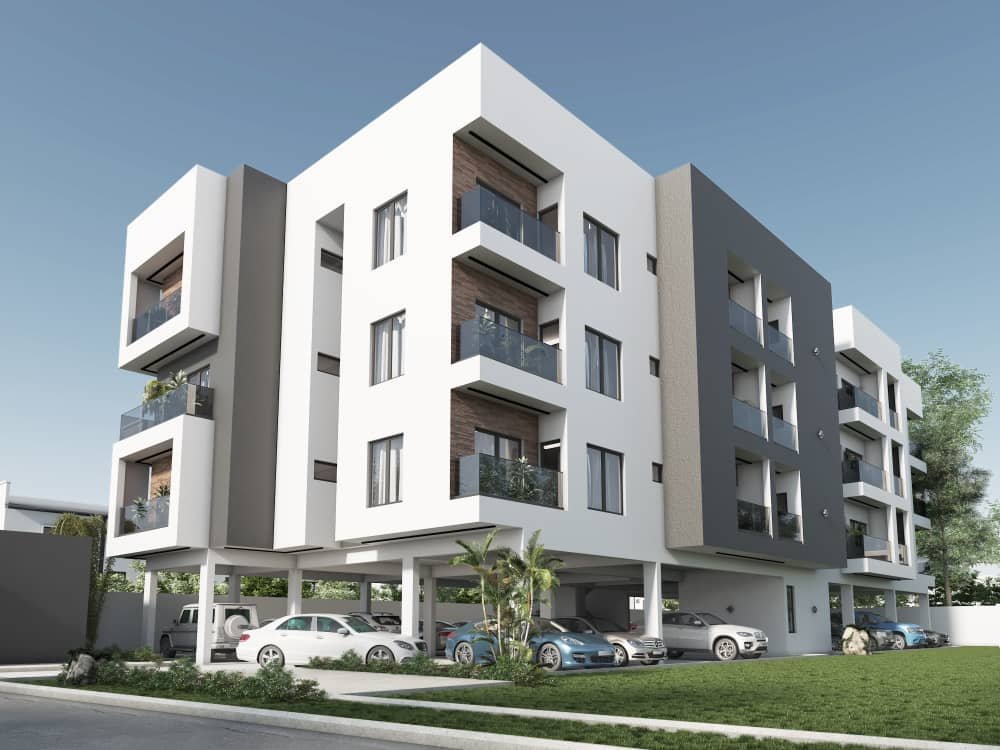
It is predicted that in the years ahead, particularly by 2025, the real estate landscape in Lagos will be shaped by a number of emerging trends.
Trends like the rise of smart homes, eco-friendly developments, and government initiatives aimed at addressing the housing deficit are primed to feature heavily in the Lagos real estate industry by 2025.
In this article, we shall explore these key trends and analyze their impact on the future of Lagos real estate.
1. The Rise of Smart Homes in Real Estate Trends in Lagos
One of the major trends that will shape the Lagos real estate market in Lagos in 2025 is the fast increasing adoption of smart home technologies by builders. As of 2024, smart homes are not widespread in Nigeria, with only about 20% of the population able to afford them.
This is largely due to the high costs associated with smart home technology, which limits its accessibility to wealthy Nigerians. Smart home systems are expensive, both in terms of initial setup and ongoing maintenance.
This financial barrier means that only wealthy Nigerians can afford the luxury of a smart home. However, there is a growing interest and aspiration among Nigerians to live in smart homes as they represent a soft life, a life of convenience, efficiency, and luxury.
Despite the current limitations, the future of smart homes in Nigerian real estate by 2025 looks promising. As more people become aware of the benefits of smart home technology, and as the cost of these technologies decreases, the adoption rate is expected to rise significantly.
Undoubtedly, the demand for smart homes is expected to grow as the middle class expands, and there is a greater desire for comfort and innovation in living spaces. Young professionals, the Gen Zs tech-savvy individuals, and expatriates are particularly inclined to invest in homes that offer convenience and modern amenities. Developers are responding by integrating Internet of Things (IoT) technologies into new builds, while also retrofitting older properties to meet these growing demands.
The demand for more sustainable and energy-efficient living spaces is also aligned with the growing campaign for sustainability, as they often feature advanced energy management systems that reduce electricity consumption. As Lagos continues to face challenges with power supply and energy efficiency, smart homes offer an appealing solution to both homeowners and developers.
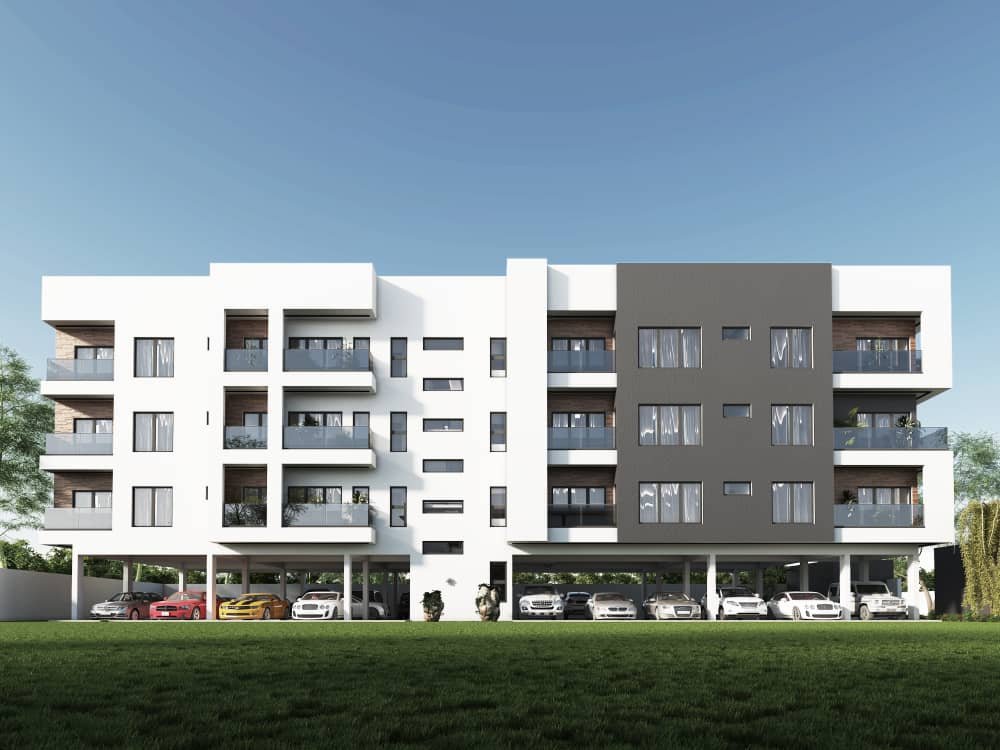
2. Eco-Friendly Developments
Another significant trend in the Lagos real estate market is the growing emphasis on eco-friendly and sustainable development practices globally. Lagos, Nigeria’s economic powerhouse and most populous city, faces numerous environmental challenges, including pollution, inadequate waste management, and rapid urban sprawl.
Against this backdrop, sustainable real estate development is emerging as a promising solution to mitigate environmental degradation while meeting the housing needs of its burgeoning population. This is expected to gain more grounds in 2025. Sustainable real estate practices encompass a range of strategies aimed at reducing carbon footprint, conserving resources, and promoting a healthier living environment.
Eco-friendly real estate properties in Lagos incorporate various sustainable features and technologies to minimize their environmental impact and enhance energy efficiency. These properties often feature:
i. Green Building Materials: Green building materials involve the use of locally sourced, renewable materials such as bamboo, recycled wood, and eco-friendly paints to reduce carbon emissions and promote sustainable forestry practices.
ii. Energy-Efficient Design: Sustainable properties integrate energy-efficient appliances, LED lighting, and solar panels to minimize energy consumption and lower utility costs for residents.
iii. Water Conservation Measures: In green buildings, water-saving fixtures, rainwater harvesting systems, and wastewater treatment plants are implemented to reduce water consumption and mitigate the strain on local water resources.
iv. Green Spaces and Landscaping: Real estate developments incorporate green spaces, rooftop gardens, and native landscaping to enhance biodiversity, improve air quality, and create aesthetically pleasing environments for residents.
v. Sustainable Infrastructure: Infrastructure improvements, such as efficient waste management systems, pedestrian-friendly walkways, and bicycle lanes, contribute to a more sustainable urban ecosystem and promote healthier lifestyles.
Essentially, as the campaign for climate change and environmental degradation continues to gain ground, property developers in Lagos are moving to integrate green building practices into their projects, a trend to watch out for in 2025 and the years that follow.
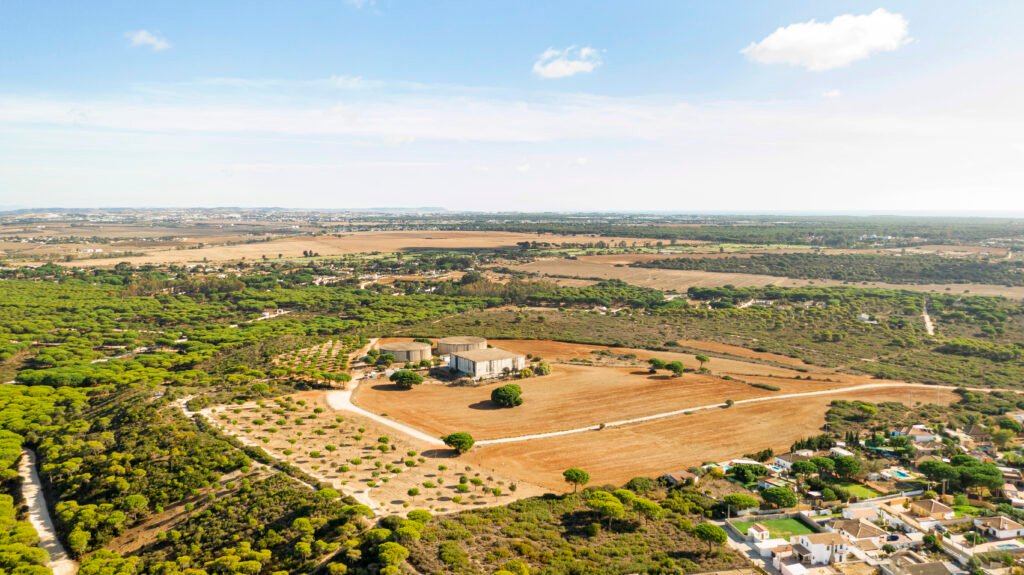
3. Moves by Government to Boost Housing Supply
Just like many other major cities in Africa, Lagos is facing a significant housing deficit. According to some industry analysts, the housing deficit in Lagos sits at over three million, and at the same time, this basic need is getting more expensive and out of reach to low and medium-income earners.
In recognition of this housing challenge, the Lagos State Government has in the last four years has been making efforts to develop mass housing schemes for dwellers.
One of the most notable initiatives is the Lagos State Government’s commitment to affordable housing projects. The government has launched several schemes aimed at increasing the stock of affordable housing for the middle and low-income segments of the population.
The Lagos State Development and Property Corporation (LSDPC) has been at the forefront of these efforts, developing residential estates in various parts of the city. Additionally, the government has been exploring public-private partnerships (PPPs) to finance large-scale housing projects, which will help accelerate the pace of construction.
The federal government, through initiatives such as the National Housing Fund (NHF), has also been working to improve access to housing finance. This initiative offers affordable mortgage loans to Nigerians, enabling them to purchase homes in the formal real estate market. As these policies and programs continue to evolve, they are expected to play a crucial role in addressing the housing gap in Lagos.
By 2025, the combined effect of government-led housing initiatives, regulatory changes, and increased private sector investment will likely lead to a more balanced real estate market in Lagos. Affordable housing is expected to become more accessible to a larger portion of the population, reducing the pressure on informal settlements and slums in the city.
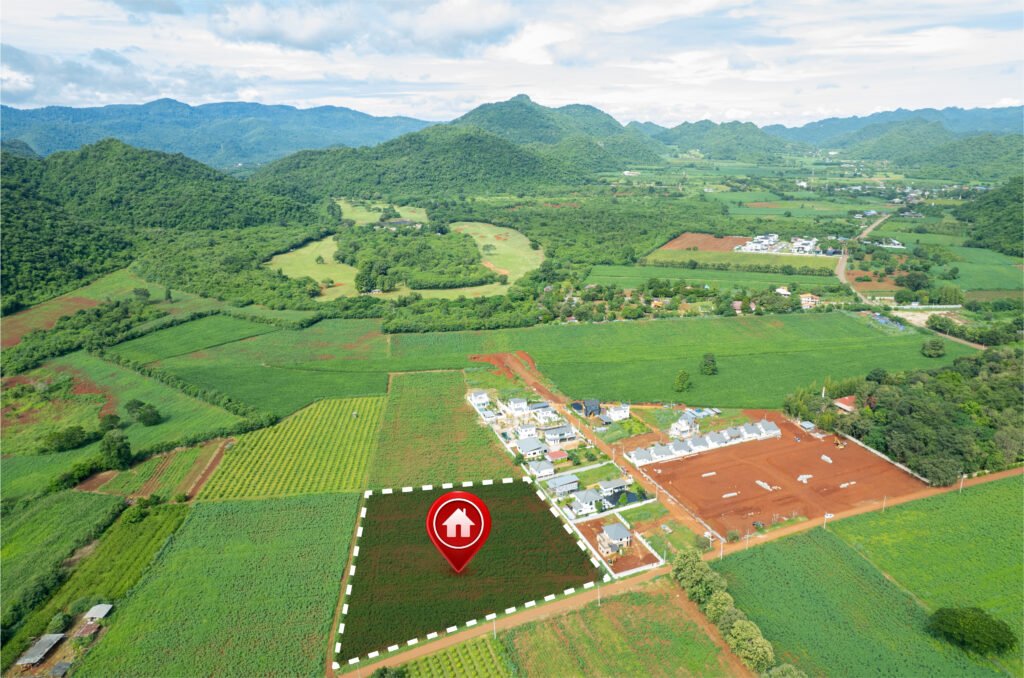
4. Increased Investment in Commercial Real Estate
In 2025 another significant trend that will shape the Lagos real estate landscape is the surge in commercial real estate developments. In addition to residential trends, the commercial real estate sector in Lagos will experience a surge in development.
Lagos is considered the financial capital of West Africa, and its status as a commercial and cultural hub keeps drawing in buyers from around the world. Because of this, the demand for office spaces, retail centers, and industrial properties is expected to rise in the coming years. By 2025, Lagos is likely to see continued growth in mixed-use developments that combine office space, residential units, and retail outlets in a single development.
Commercial real estate in Lagos will also benefit from the increasing digitalization of businesses. As more companies embrace e-commerce and online platforms, there is a growing demand for logistics hubs and warehouses to support the distribution of goods. This trend will lead to increased investment in industrial properties and commercial spaces tailored to the needs of businesses operating in the tech, logistics, and retail sectors.
Furthermore, as international companies expand their presence in Lagos, there will be a higher demand for premium office spaces, particularly in prime locations such as Victoria Island, Lekki, and Ikeja. The influx of foreign investment will create opportunities for developers to meet the needs of a global business environment in Lagos.

5. Property Prices will increase
Another significant trend to look out for in Lagos in 2025 is the increase in property prices.
Some factors that suggests prices could increase in Lagos real estate by 2025 include:
i. The ongoing urbanization and population growth in Lagos are expected to continue, leading to increased demand for housing. As more people move to the city for job opportunities, the pressure on the housing market is likely to drive prices up.
ii. Infrastructure development projects, including the expansion of the Lagos-Ibadan Expressway and the construction of the Fourth Mainland Bridge, are poised to significantly enhance the city’s connectivity and accessibility. These projects aim to reduce travel times between key areas, making it easier for commuters and businesses to move across Lagos and its neighboring regions.
The expanded expressway, which links Lagos to Ibadan, will facilitate smoother interstate travel, while the Fourth Mainland Bridge will provide an additional route to relieve congestion on existing roads, especially in the highly trafficked Lagos mainland and island corridors. Together, these projects are expected to transform Lagos into a more connected and efficient urban hub.
As a result of these infrastructure improvements, previously less accessible or underdeveloped areas in Lagos are likely to see a rise in attractiveness. Increased connectivity often leads to a higher demand for residential, commercial, and industrial properties in these newly accessible zones.
Consequently, property values in the surrounding areas are expected to appreciate as investors, developers, and homebuyers seek to capitalize on the enhanced infrastructure. By 2025, this boost in infrastructure could lead to significant urban growth, with certain districts becoming more sought-after for both living and business purposes, ultimately shaping the future landscape of Lagos.
iii. The government’s emphasis on enhancing the ease of doing business in Nigeria is anticipated to draw more foreign investment, particularly in the real estate sector. This influx of capital is likely to drive higher demand for both commercial and residential properties.
v. The rapid growth of the tech industry in Lagos, coupled with the establishment of innovation hubs and tech clusters, is reshaping the city’s real estate landscape. As the city becomes a hotbed for startups, digital entrepreneurs, and tech professionals, there has been a noticeable influx of young talent seeking housing close to their workplaces or areas with a vibrant tech community.
This growing demand is driving interest in modern, well-equipped housing solutions, such as co-living spaces, high-rise apartments, and smart homes. Neighborhoods that are home to tech hubs, like Yaba and Lekki, are becoming increasingly attractive to both renters and buyers. As a result, property values in these tech-friendly areas are expected to rise, reflecting the growing demand for convenient, contemporary living spaces.
vi. The scarcity of available land for new developments in prime areas of Lagos is a key factor that will likely keep the supply of real estate limited. Many of the city’s most sought-after neighborhoods, such as Victoria Island, Ikoyi, and Lekki, are already heavily built-up, making it increasingly difficult to find land for large-scale residential or commercial projects.
This constraint on land availability, combined with the steady demand driven by population growth, urbanization, and business expansion, is expected to create upward pressure on property prices. With fewer opportunities for development in these prime locations, property values are anticipated to rise as buyers and investors compete for the limited supply of available real estate, further increasing the cost of living and doing business in the city.
From the foregoing, it is expected that real estate prices in Lagos in 2025 will rise. However, if real estate prices in Lagos were to rise in 2025, the increase would likely be between 5% to 10% of their 2024 values.
In dynamic, emerging markets like Lagos, real estate generally appreciates at a rate of around 5% to 10% annually over the long term. However, this growth can fluctuate based on factors such as location, economic conditions, and property type.
For instance, if you come across a well-located 2-bedroom apartment in Victoria Island priced at 50 million Naira today, it’s not uncommon to see its value rise to between 52.5 million and 55 million Naira within the next year.
Conclusion
The future of real estate in Lagos looks promising, with a combination of technological advancements, sustainability initiatives, and government policies driving the market towards more innovative and efficient developments.
The rise of smart homes, eco-friendly developments, and government-backed housing schemes will significantly shape the city’s real estate landscape in 2025 and beyond. Furthermore, new infrastructural developments as well as other existing factors will drive up prices of properties in most parts of the state.
As Lagos continues to grow and urbanize, these trends will not only enhance the quality of life for its residents but also create lucrative investment opportunities for developers, investors, and stakeholders in the real estate industry. The next few years will be an exciting time for Lagos real estate, as these trends come together to create a more dynamic and sustainable urban environment.

